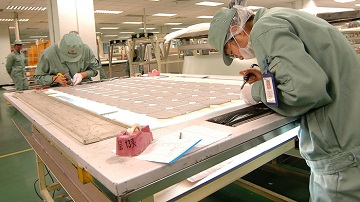Day of reckoning comes for China's solar industry which could destroy US & Europe solar renaissance
 Is Suntech too big a Chinese brand to fail?
Is Suntech too big a Chinese brand to fail?On March 15, the cash-strapped solar company—until recently the world’s biggest photovoltaic panel maker—faces a $541 million payment on convertible notes, a quarter of the $2 billion in debt it has incurred.
Whether Suntech can strike a deal with its bondholders or secure a government bailout will set the stage for the collapse or consolidation of the Chinese solar industry. Other photovoltaic giants, including Trina Solar and JA Solar, also face crushing debt and overcapacity—a result of a rapid expansion of manufacturing that sent solar panel prices plummeting and allowed China to dominate the global market.
Given that Suntech founder Zhengrong Shi became famous as China’s one-time billionaire Sun King, it’s tempting to draw Shakespearian allusions as March 15 approaches – the Ides of March and all. Except that the Suntech board dispatched this solar Caesar on Monday, replacing him as executive chairman seven months after he stepped down as chief executive. But he’s not going, quietly or otherwise. Shi issued a statement yesterday decrying his removal as “invalid and of no effect.”
The boardroom brawl may cheer US and European competitors that successfully brought trade cases against Chinese companies that resulted in the imposition of tariffs. But the bankruptcy of Suntech or other major Chinese module makers could prove disastrous to solar installers in the US and Europe that have seen their business boom as solar panel prices have fallen 75% in recent years.
Look up at a rooftop array in California and it’s likely the solar panels came from China. Between 2007 and 2010, for instance, China’s share of the California market jumped from 2% to 46%. If Suntech and other Chinese companies go bankrupt, warranties on their solar panels will likely become worthless, leaving solar installers like SolarCity liable for any future product failures.
“Those solar installers are on the front lines,” says Ian Gregory, a product specialist at SolarBuyer, a Marlborough, Massachusetts-based firm that procures and tests solar panels for financiers and developers.
A Suntech representative did not respond to a request for comment. But a November 2012 presentation the company made to bondholders illustrates its predicament.
As of Aug. 31, 2012, Suntech had $524 million in cash and $2 billion in debt. About half of the debt is held by the company’s Cayman Islands-registered subsidiary, according to the presentation filed with the US Securities and Exchange Commission.
And that could complicate efforts to arrange a Chinese government bailout. Suntech noted in the presentation that “loans may be available to refinance existing bank debt as it matures but credit support to repay offshore debt is not available.”
That offshore debt ballooned last year when Suntech found itself liable for guaranteeing a €554 million ($721 million) credit line extended to customers of a European joint venture called Global Solar Fund (GSF). Suntech’s partner in the venture had pledged German bonds as collateral for the credit line but Suntech subsequently discovered those bonds did not exist and claimed it was a victim of fraud.
That leaves Suntech with few options. As it told bondholders:
“Suntech does not believe it could successfully market bonds at this time. GSF not saleable until litigation resolved; no other non-core assets sizable enough to generate significant proceeds; limited interest in manufacturing capacity.”
The most likely solution, Suntech said, would be to restructure the convertible notes.
Suntech’s fall has been even more rapid than its rise. Shi founded Suntech in 2001 in Wuxi, China, after earning his doctorate at one of the world’s leading photovoltaic research institutes at the University of New South Wales in Sydney, Australia.
“He knew we had the best technology at the University of New South Wales and he believed he could commercialize it so he set up Suntech to do it,” Stuart Wenham, Suntech’s chief technology officer and a professor at the university, said at a dinner in San Francisco last year.
Conventional wisdom has it that Suntech and other Chinese companies came to dominate the solar market by exploiting cheap government loans and cheap labor.
Those were factors. But Shi pioneered a model that would be copied by other Chinese solar entrepreneurs. Shi, who holds Australian citizenship, licensed the University of New South Wales’ solar technology and recruited its best graduates. Over the years, Suntech became the biggest funder of the university’s research, according to Wenham, ensuring a pipeline of new technology and graduates would continue to flow to the company.
“The Chinese are very, very good at looking around the world at what all the different research groups have to offer and then they seem to have the ability to identify good technologies to commercialize and to do that very, very effectively,” said Wenham.
Successfully managing a global business has been another matter. But Anthony Kim, a solar analyst with market research firm Bloomberg New Energy Finance, says he doesn’t believe the Chinese government will allow Suntech to fail given that it’s one of China’s few recognizable global brands.
The most likely scenario, he says, would be for the local government that has provided Suntech with its initial financing to bail out the company.
“Suntech as a company will continue to exist even if it’s under a different ownership structure,” says Kim.
You can return to the main Market News page, or press the Back button on your browser.

